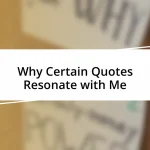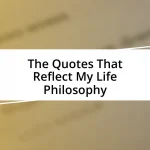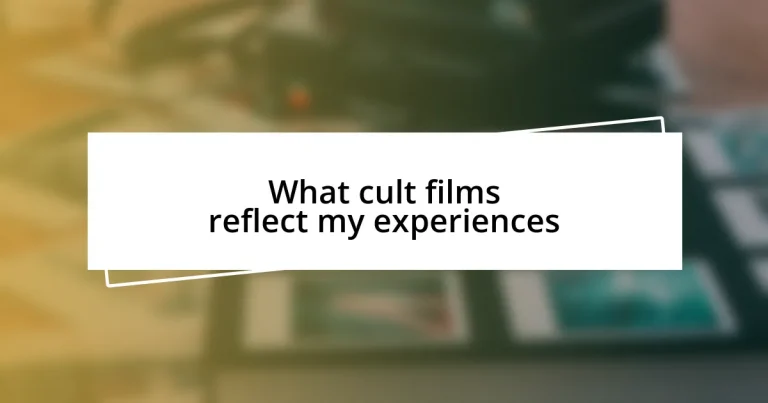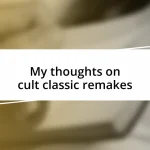Key takeaways:
- Cult films provoke introspection and foster deep connections among audiences through unconventional storytelling and quirky narratives.
- Shared experiences, such as participatory screenings, create a sense of community and belonging among fans.
- Many cult films explore themes of identity, belonging, and individuality, resonating with personal experiences and emotions.
- Creating a personal cult film list allows for the exploration of one’s passions and life moments, capturing transformative cinematic experiences.
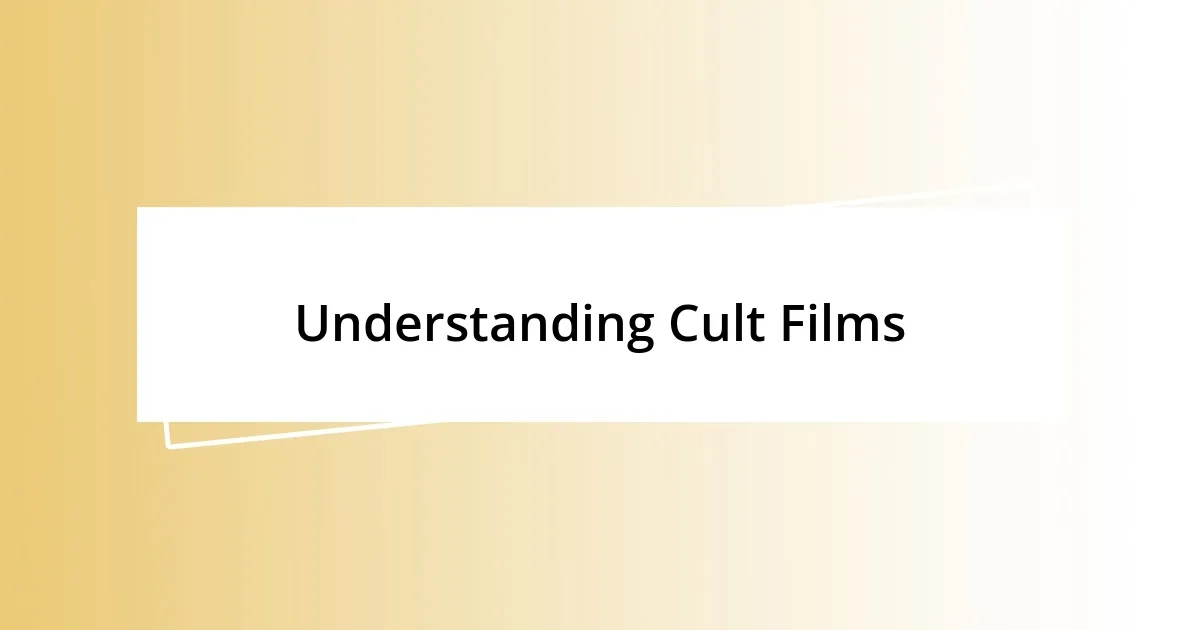
Understanding Cult Films
Cult films hold a unique place in cinema, often resonating with audiences in ways that mainstream movies simply don’t. I remember the first time I watched “The Rocky Horror Picture Show.” The experience was electric, not just because of the film itself, but due to the audience interaction. Have you ever felt the thrill of being part of a community that celebrates a shared love for something unconventional?
These films typically feature eccentric narratives, quirky characters, or avant-garde styles that challenge societal norms. Think of “Donnie Darko,” a movie that intertwines psychological thriller with a dose of existential philosophy. I found myself pondering its themes long after the credits rolled, and it sparked deep conversations with friends about fate and choice. Isn’t it fascinating how some films can make us question our reality and inspire introspection?
Moreover, cult films often thrive outside conventional success metrics. They build passionate followings that transcend generations. For instance, when I watched “A Clockwork Orange” in college, the intense discussions it ignited about morality and free will were unforgettable. Can a film truly change our perspective? I’d argue that cult classics have a magical ability to provoke thought, challenge beliefs, and create lasting emotional connections.
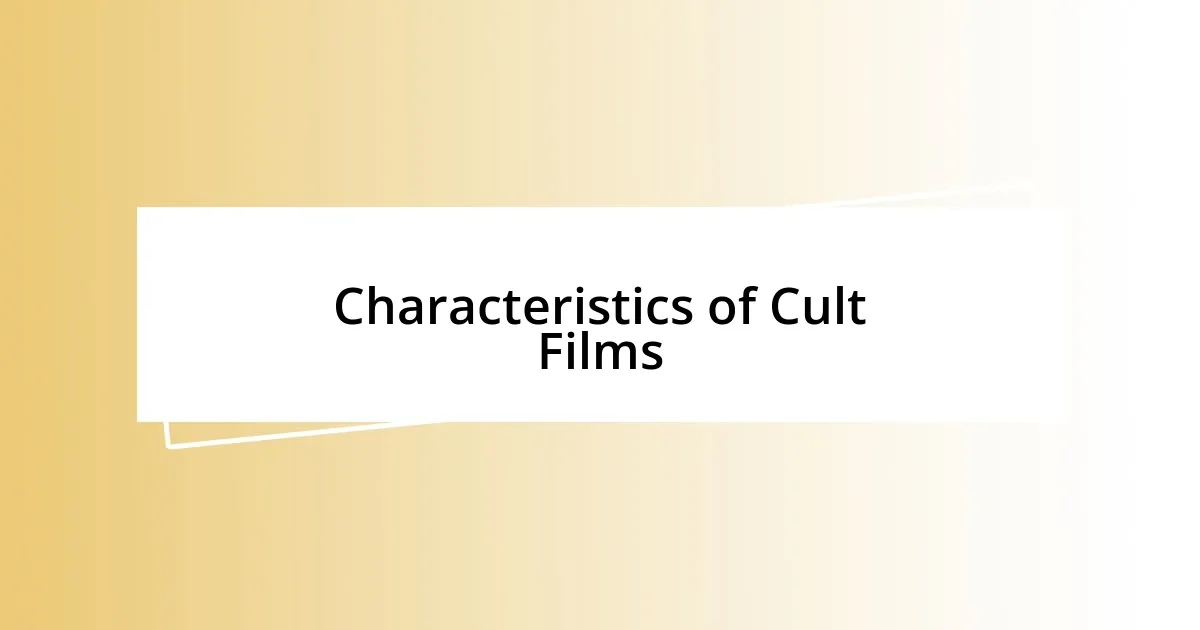
Characteristics of Cult Films
Cult films often embody a distinct set of characteristics that set them apart from mainstream cinema. They frequently embrace unconventional storytelling, drawing viewers into surreal worlds where logic may take a backseat. I recall watching “Eraserhead” for the first time; its haunting visuals left me in a trance, challenging my perception of reality and leaving me with a feeling that lingered well beyond the credits. Isn’t it intriguing how a film can evoke such strong emotions, leaving us questioning what we just witnessed?
Another hallmark of cult films is their ability to forge a strong sense of community among fans. I remember attending a late-night screening of “The Room” and participating in the audience’s infamous call-and-response antics. It wasn’t just about watching the movie; it became a shared experience filled with laughter and camaraderie. This participatory culture transforms the act of viewing into something much deeper—an essential connection between the film and its audience.
Cult films also tend to celebrate the flawed and the weird. Characters that mainstream movies might dismiss as outcasts become heroes in these narratives. Take “Napoleon Dynamite,” for instance. I found its quirky nature oddly relatable, reflecting the awkwardness of adolescence. This film encouraged me to embrace my own uniqueness, reminding me that being different can be a strength. Isn’t it empowering to find solace in stories that resonate with our personal experiences?
| Characteristic | Description |
|---|---|
| Unconventional Storytelling | Features surreal, illogical narratives that challenge viewers’ perceptions. |
| Community Engagement | Encourages audience interaction, often creating a shared experience. |
| Celebration of Uniqueness | Focuses on eccentric characters and themes, promoting individuality. |
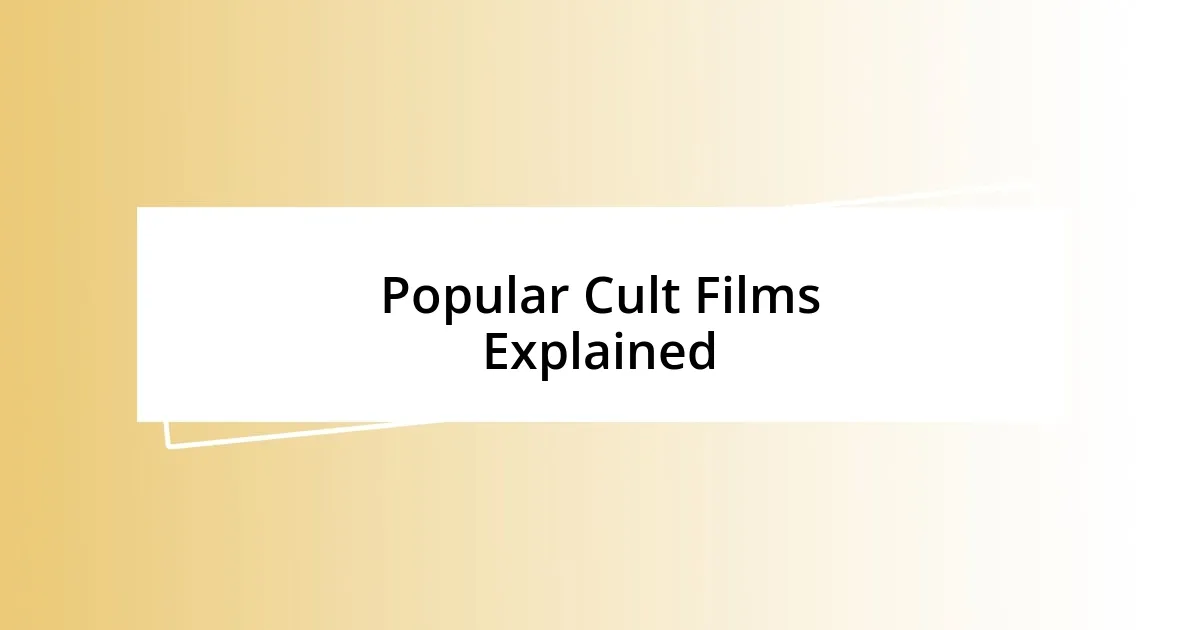
Popular Cult Films Explained
Cult films have a way of making a lasting impression, not just through their plot or visuals, but through their unconventional approach to storytelling. Take “Fight Club,” for instance. The first time I watched it, I was blown away by the exploration of identity and consumerism. I found myself questioning my own beliefs about fulfillment and conformity. It’s profound how a film can shake the foundations of our understanding of masculinity and modern life, isn’t it?
There’s also a unique charm in how cult films cultivate devoted fanbases that celebrate their quirks. For example, during a screening of “Hocus Pocus,” I was surrounded by fans quoting lines and dressing up as their favorite characters. This infectious enthusiasm created a vibrant atmosphere that transformed a simple movie night into a celebration of shared nostalgia. It made me reflect on how these films serve as cultural touchstones—collective memories that connect us in ways we may not even realize.
- Unpredictable Narratives: The plots often defy traditional storytelling, leading viewers to unexpected places.
- Cultivation of Community: Fans gather to share experiences, creating a sense of belonging that transcends the screen.
- Resonance of Themes: Many cult films touch on themes of rebellion, identity, or existential questions, prompting personal introspection.
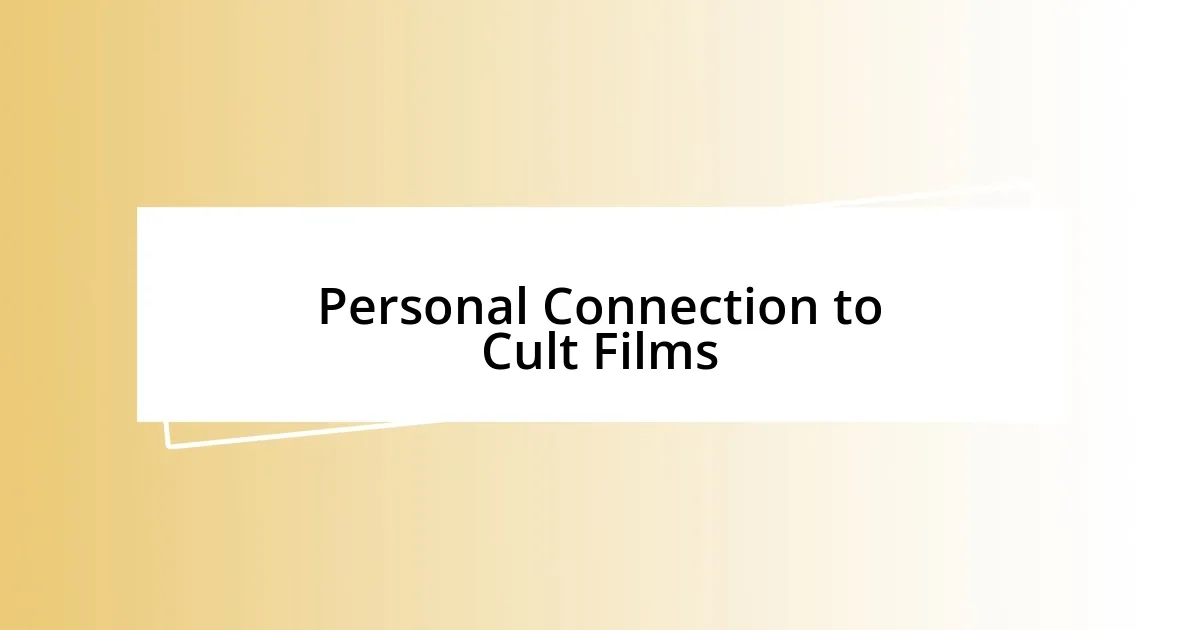
Personal Connection to Cult Films
There’s something incredibly intimate about the way cult films intertwine with my experiences. I remember my late-night Netflix binge of “Donnie Darko.” The film’s eerie atmosphere and its existential themes resonated with me during a time when I was grappling with my own identity. As I navigated the murky waters of adolescence, wondering about fate and my place in the universe, the film became a sort of mirror, reflecting my internal struggles.
One of the most memorable experiences I had was at a midnight screening of “Rocky Horror Picture Show.” The audience was electrified, dressed in costumes, and ready for interactive participation. I joined in with the chants and improvised lines, and it felt like being part of a living, breathing entity that celebrated acceptance. Isn’t it fascinating how these moments foster a sense of belonging and camaraderie among strangers?
Cult films have also shaped my understanding of resilience and self-acceptance. Watching “The Big Lebowski” for the first time, I was struck by the Dude’s laid-back attitude in the face of chaos. It inspired me to embrace life’s unpredictability. When I reflect on my own challenges, I realize that sometimes, just going with the flow is the best way to navigate the ups and downs. Don’t you think it’s refreshing to see characters who thrive on their own terms?
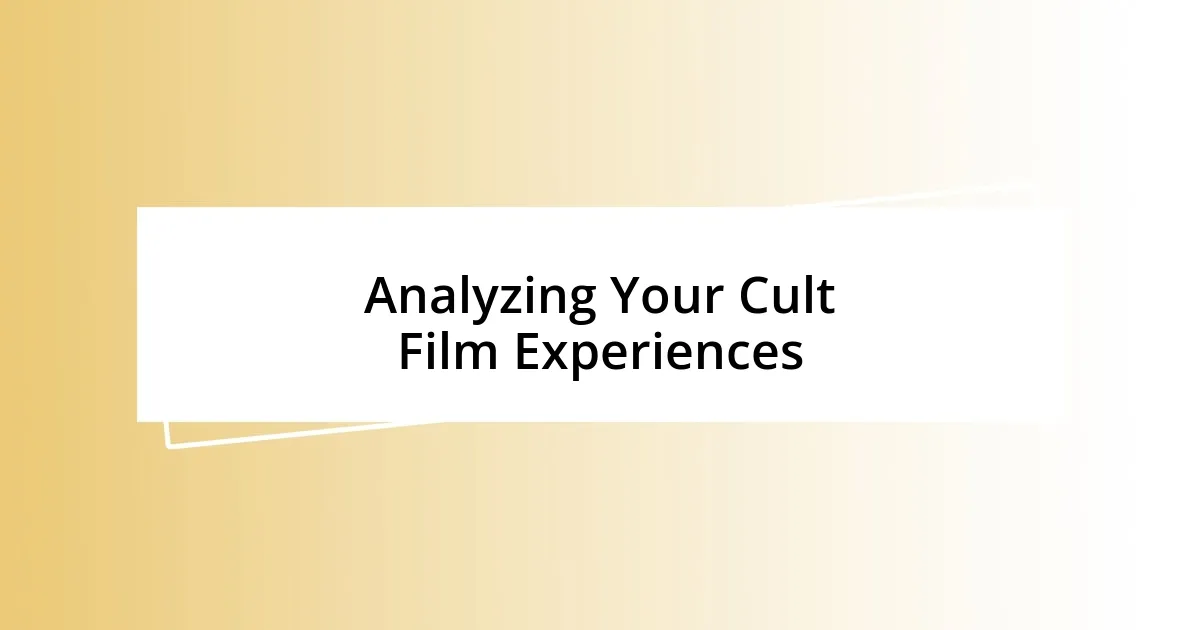
Analyzing Your Cult Film Experiences
Analyzing my experiences with cult films often feels like peeling back layers of my own identity. Watching “Trainspotting,” for instance, left me with lingering thoughts about addiction and friendship. I found myself pondering my own relationships and the choices I made at critical junctures in my life. Isn’t it intriguing how a film can make us introspective in such profound ways?
Reflecting on those late-night discussions with friends after a viewing of “The Room” brings a smile to my face. We laughed, we cringed, but most importantly, we bonded over the shared experience of trying to decipher its bizarre narrative. It was in those moments that I realized how these films create not just personal connections, but communal ones that foster laughter and understanding. Can you recall a time when a film brought you closer to your friends?
I also can’t help but think of “Eraserhead,” which I watched during a particularly unsettling period of my life. Its surreal imagery and haunting soundscapes mirrored my own feelings of anxiety and confusion. I found comfort in the chaos, realizing that it’s okay to feel lost sometimes. How often do we forget that these films, though unconventional, can validate our emotional states and allow us to embrace our complexities?
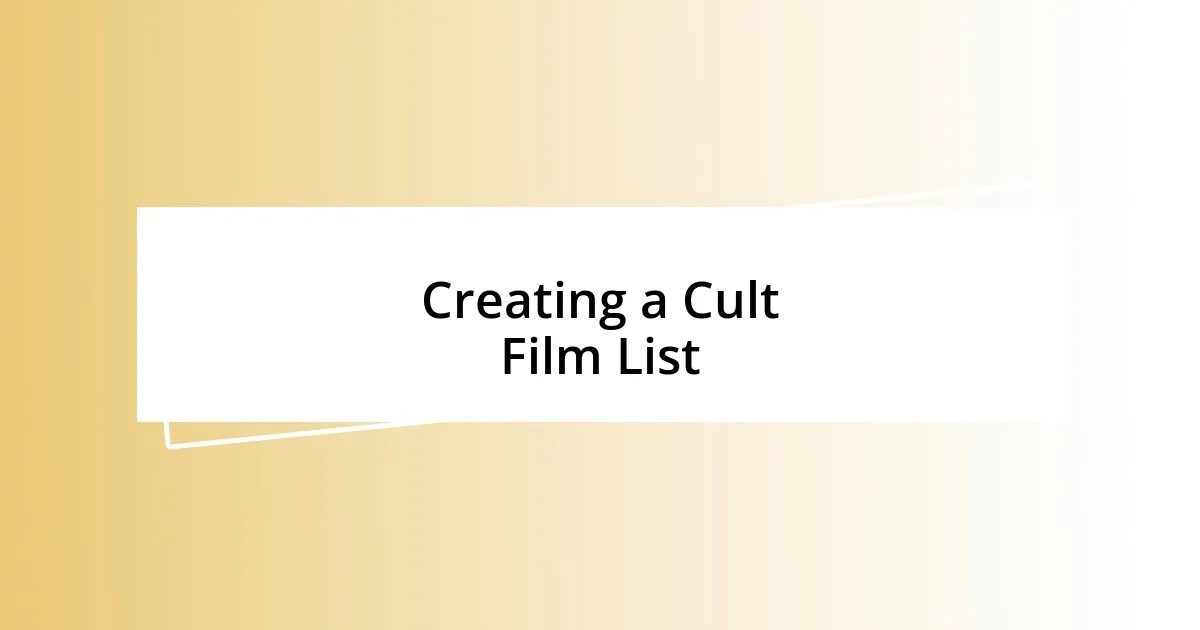
Creating a Cult Film List
Creating a cult film list is more than just compiling titles; it’s an exploration of my passions and obsessions. I remember the moment I first jotted down my favorites – it felt oddly exhilarating. Each title represented not just entertainment, but also a piece of my soul that had been touched or transformed by those stories. What would your list reveal about you?
When curating my list, I often include films that spark a visceral reaction, like “Heathers.” Its dark humor and satirical take on teenage angst reminded me of my high school days, a blend of longing and mischief. It’s intriguing how certain films become time capsules, capturing not only cinematic artistry but also the emotions we felt at pivotal moments. Which films serve as your personal time capsules?
Some titles are there solely for their ability to cultivate community, like “Ghostbusters.” Watching it ignites nostalgia and a sense of warmth, as I recall gathering with friends for marathons that turned into spontaneous dance parties. It truly shows the power of film to create not just personal connections but lasting memories. How do your favorite cult films define those incredible moments of connection with others?
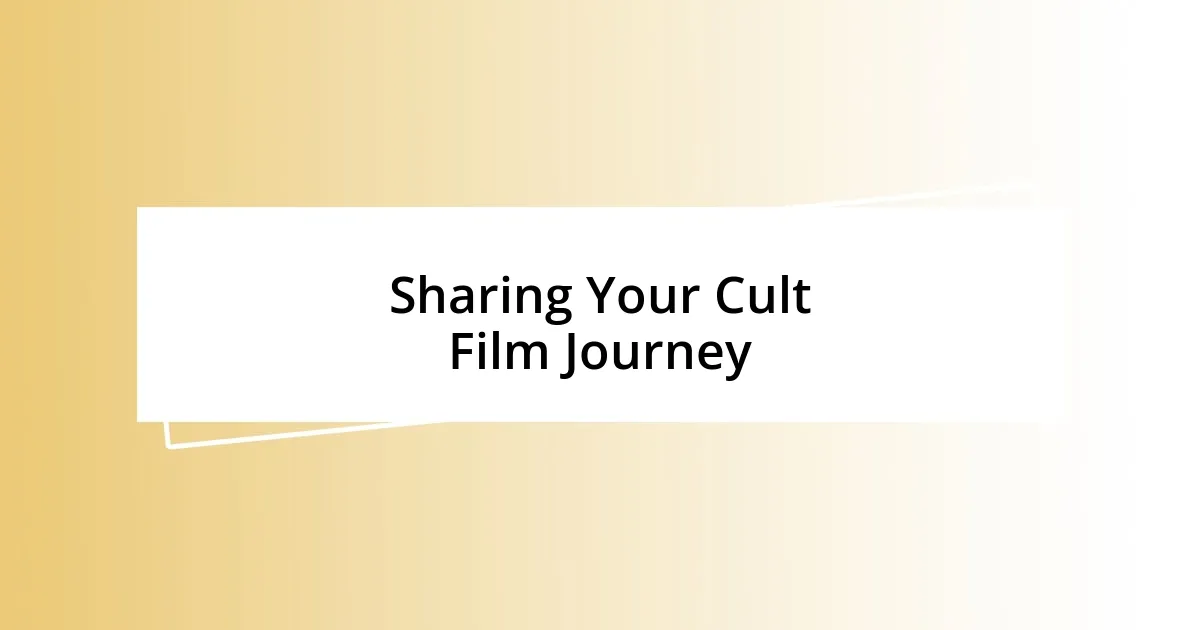
Sharing Your Cult Film Journey
Sharing your journey with cult films can be a deeply personal experience. I remember the thrill of discovering “Donnie Darko” alongside a group of friends during a sleepover. We spent hours dissecting its twists and turns, creating theories that ranged from the absurd to the profound. That experience felt more than just watching a movie; it was about finding like-minded souls who shared my fascination with the bizarre and the intricate. Have you ever had a film lead you into unexpected, enlightening conversations?
Some of my fondest memories revolve around cult film screenings at local theaters. One night, I attended a midnight showing of “Rocky Horror Picture Show,” where the audience became part of the performance. As we sang, danced, and shouted lines in unison, I realized how these films transform mere spectators into a community, each person sharing in the joy of rebellion and absurdity. Can you think of a time when a film transformed you into something more than just a viewer?
Throughout my cult film journey, I’ve also learned that every film has the potential to shape my perspective. When I first watched “The Big Lebowski,” it struck me how its offbeat charm mirrored my own laid-back approach to life. I found camaraderie in the Dude’s casual philosophy, reminding me that it’s perfectly fine to embrace life’s unpredictability. Have you ever found solace in a character’s quirks that reflect your own?

